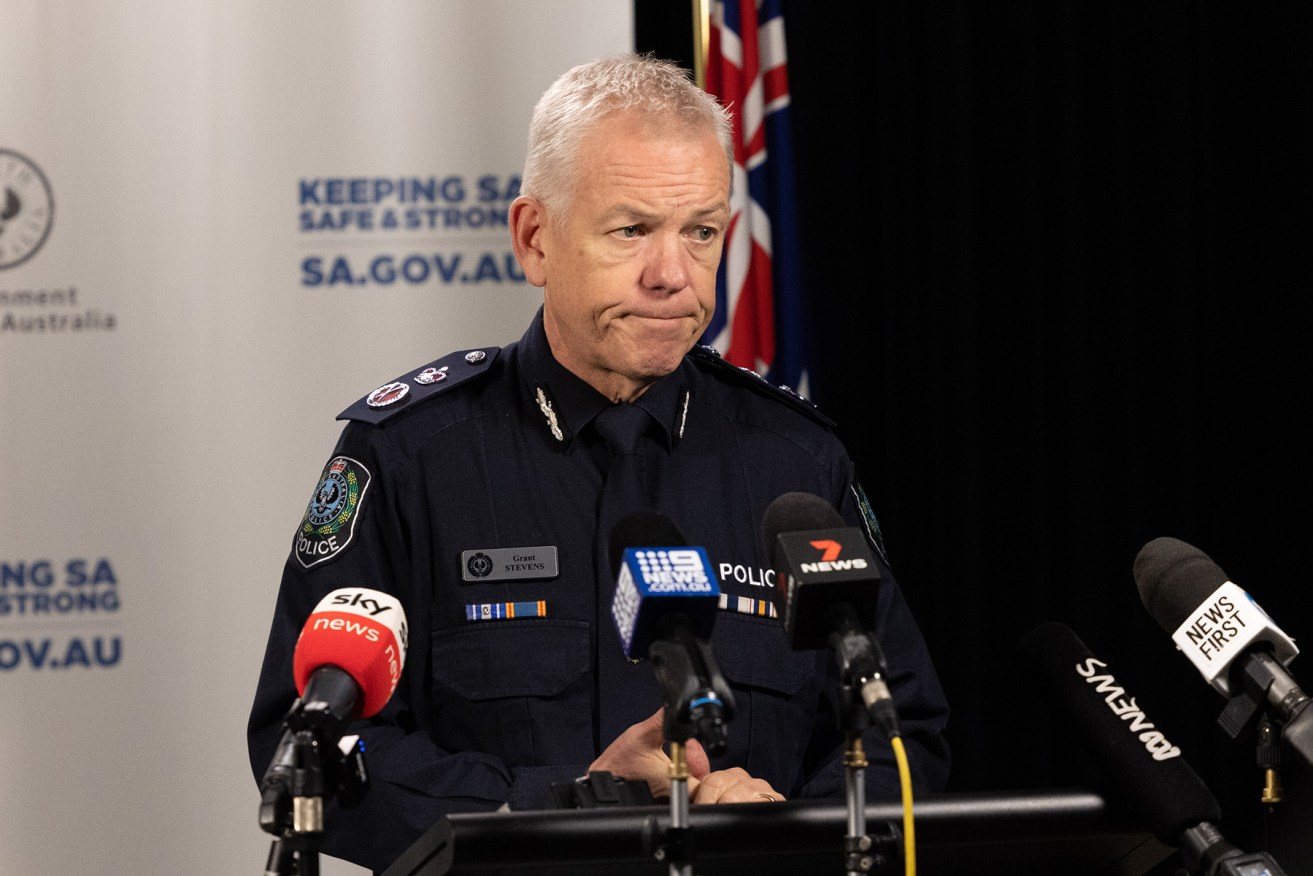Time for close examination of pandemic emergency powers
MPs need to subject the extraordinary powers wielded by non-elected officials to independent scrutiny, argues Sarah Moulds.

Police Commissioner Grant Stevens. (Photo: Tony Lewis/InDaily)
On Wednesday 1 December, whilst most South Australians were enjoying the summery weather, key provisions of the COVID-19 Emergency Response Act 2020 (SA) quietly expired.
First enacted in May 2020, the COVID-19 Response Act is designed to complement other legal responses to the pandemic.
The measures that expired on 1 December 2021 included those that were designed to ease the pressure on renters and people living in supported residential facilities, who may have suffered financial hardship as a result of the COVID-19 pandemic.
Also expired is Schedule 2 of the COVID-19 Response Act, which modified the scope of powers exercisable by the State Coordinator under section 25 of the Emergency Management Act 2004 (SA).
In its previous form, Schedule 2, authorised the State Co-ordinator or an authorised officer to “exercise or discharge a power or function under [section 25 the Emergency Management Act] even if to do so would contravene another law of the State.” It also authorised the State Co-ordinator to make directions with respect to classes of persons, or exempt classes of persons from the scope of the directions. These modifications are now no longer in force.
This does not mean that the State Co-ordinator can no longer issue directions or exercise powers in response to the COVID-19 pandemic. The Coordinator remains authorised under section 25 of the Emergency Management Act to do things like “direct a person to remain isolated or segregated from other persons or to take other measures to prevent the transmission of a disease or condition to other persons”.
At what point in the future should we expect the Parliament to step in and define with more transparency and clarity the types of powers that can or should be exercised by law enforcement and other authorities?
The State Coordinator is also given a broad authorisation to “take any necessary action to implement the State Emergency Management Plan”, provided the Declaration of a Major Emergency remains in force. The breadth of this provision may have led Commissioner Stevens to tell ABC Adelaide 891 Radio on Wednesday that the COVID-19 Response Act was a “miscellaneous bit of legislation that was necessary during the course of the pandemic, but it does not impact on my powers under the Declaration that I made back on the 22nd of March.”
However, the expiry of Schedule 2 of the COVID-19 Response Act raises some important questions for the South Australian Parliament and the South Australian community, particularly when consideration is given to the broader context in which these extraordinary laws were originally made. For example:
Why were the modifications to the State Coordinator’s powers considered necessary and appropriate in May 2020 and again earlier this year, but are now no longer relevant at all?
How can the Declaration of a Major Emergency, which has been extended more than twenty times, continue to justify the use of broad, discretionary police powers but no longer justify protections for vulnerable renters and those living in residential facilities?
At what point in the future should we expect the Parliament to step in and define with more transparency and clarity the types of powers that can or should be exercised by law enforcement and other authorities?
Finding the answers to these questions is not easy. Even asking them risks being characterised as criticising the gallant efforts of the South Australian police and other authorities who are working so hard to keep us safe. That is not something I want to do.
But if we don’t start asking at least some questions about these extraordinary laws – which were originally designed to deal with floods and fires and not long-term pandemics – we risk them becoming part of the ordinary. We risk undermining the value and authority of the Parliament as the democratic forum for debating and enacting laws. We risk alienating the communities our elected representatives are tasked with representing.
One pathway forward for the South Australian Parliament would be to subject these emergency laws to independent scrutiny for their compliance with human rights standards. Checking to see, for example, whether the laws which are designed to protect the right to health are proportionate in terms of their impact on other rights, such as the right to housing and the right to social security. This would give members of parliament and the community a clearer sense of what the current laws actually say and do, as well as whether the laws ‘get the balance right’ when it comes to protection and restriction.
This type of rights scrutiny would not have to lead to an invalidation of the existing directions or laws made in response to the pandemic or undermine the authority of the State Coordinator. But it could be used as a form of oversight and accountability and a foundation for future parliamentary responses to the COVID-19 pandemic as we move towards 2022 and beyond.
These are some of the issues that will be considered by a group of community leaders and multi-discipline experts on 10 December 2021, International Human Rights Day, at an online forum convened by the Rights Resource Network SA to discuss the development of a human rights framework for South Australia. The results of this discussion will be shared with South Australian parliamentarians before the March 2022 election.
Dr Sarah Moulds is Senior Lecturer in Law, Justice and Society, University of South Australia and Director, Rights Resource Network SA.




